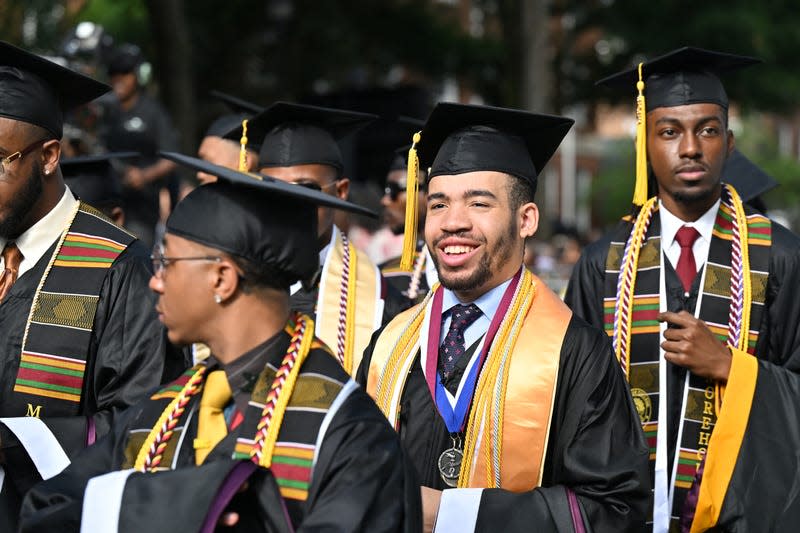Former White House Insider On How Biden Should Address Morehouse Graduates

- Oops!Something went wrong.Please try again later.
Last night, I flew home to Atlanta for my sister’s graduation from Spelman. President Biden will of course be here on Sunday to address the Morehouse College class of 2024. And while I won’t be there to hear him speak, I have a few ideas about what he should consider saying.
The president should first recognize that he will be speaking to a skeptical audience. I drove to Morehouse this afternoon in hopes of finding some graduates willing to share their thoughts about the president’s speech with me. Between graduation photoshoots and interviews with local news crews, a few kind Morehouse men stopped to chat. Decked out in their maroon and white, they seemed unimpressed that the president was coming to speak to them. There was a sense that his visit was merely political pandering. While it’s impossible to remove politics from the equation, it will be imperative for the president to make clear why he accepted the school’s invitation. I think his reasons were twofold: first, he knows about the power and legacy of Morehouse College; and second, he knows that delivering this address presents a tremendous opportunity for him to speak directly to young Black men.
Many young Black voters — especially young Black men — are feeling unloved, unheard, and unsupported by the Democratic party. They hear that Bidenomics is working, but they still see high prices at the grocery store. They hear that police reform and voting rights are top priorities, but they still see Black men getting shot by the police and voter suppression running rampant. They hear that reparations are unlikely, but they see $95 billion more for Ukraine, Israel, and Taiwan. Now that we’re sixty years removed from the signing of the Civil Rights Act, young Black voters today are less likely to give the Democratic Party the benefit of the doubt. They expect more.
President Biden must confront this reality head-on. He must make the graduates feel like he sees them before he tries to sell them. He has been in Washington for a long time, and he knows that even as Black voters have turned out reliably for Democratic candidates, those candidates have often failed to return the favor. After Black voters saved his campaign four years ago, I believe President Biden has worked hard to be the exception to that rule. At the same time, he would probably be the first to admit that he must do more. He should address these tensions right off the bat and find ways to validate the frustrations that so many in our community are feeling.
Going a step further, President Biden must speak to the threats facing young Black men and talk about what he is doing to make the country a safer place for the graduates. When I spoke with CEO of the National Association of Social Workers, Dr. Anthony Estreet, he said the president must clearly state how he plans to be a champion for Black people. One example is on the issue of mental health. Right now, suicide is one of the leading causes of death for Black men ages 15-24. Over the past 20 years, the suicide rate for Black youth ages 10-19 has increased by a staggering 60%. The Biden-Harris administration has been investing heavily on the prevention front. Just last week, the Department of Health and Human Services announced nearly $50 million to support suicide prevention and expand access to youth mental health services in communities of color. Highlighting this work along with his administration’s efforts to cancel student debt, get guns off the streets, and rectify injustices in our justice system would go a long way.
Finally, the president must assign the graduates leading roles in charting our nation’s future. From Julian Bond to Dr. Martin Luther King Jr., Morehouse men have been on the frontlines of moving our nation forward for the past 150 years. The president should remind the graduates — as President Obama did when he addressed the Morehouse class of 2013 — that they are “heirs to a great legacy.” A legacy of excellence. A legacy of innovation. And a legacy of positive social change. To continue that legacy will require the graduates to use their voice — and more importantly, their vote — to determine for themselves the direction our country will go down. While they might disagree with the president, and with each other, on some major policy issues along the way, dissent is the hallmark of a strong democracy. But whether our democracy endures could very well come down to the men of Morehouse.
They say you can always tell a Morehouse man, but you can’t tell him much. This Sunday, President Biden has an opportunity to say a thing or two to the class of 2024. But more importantly, he has an opportunity to follow his speech with bold actions. President Biden is counting on young Black men to turn out for him one more time. He has six more months to make his case.
Gevin Reynolds is a former speechwriter to Vice President Kamala Harris and a regular panelist on Roland Martin Unfiltered. Follow him on X at @GevinReynolds.

